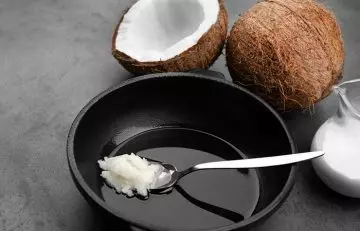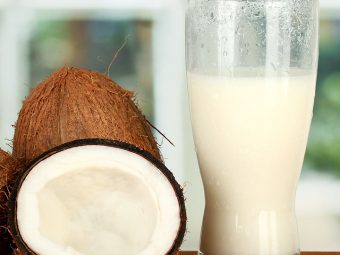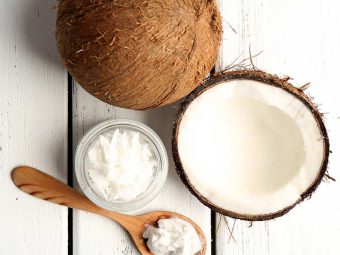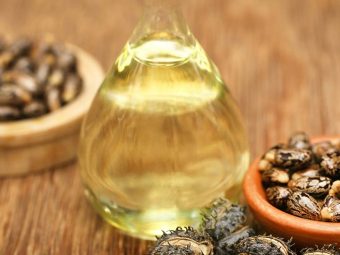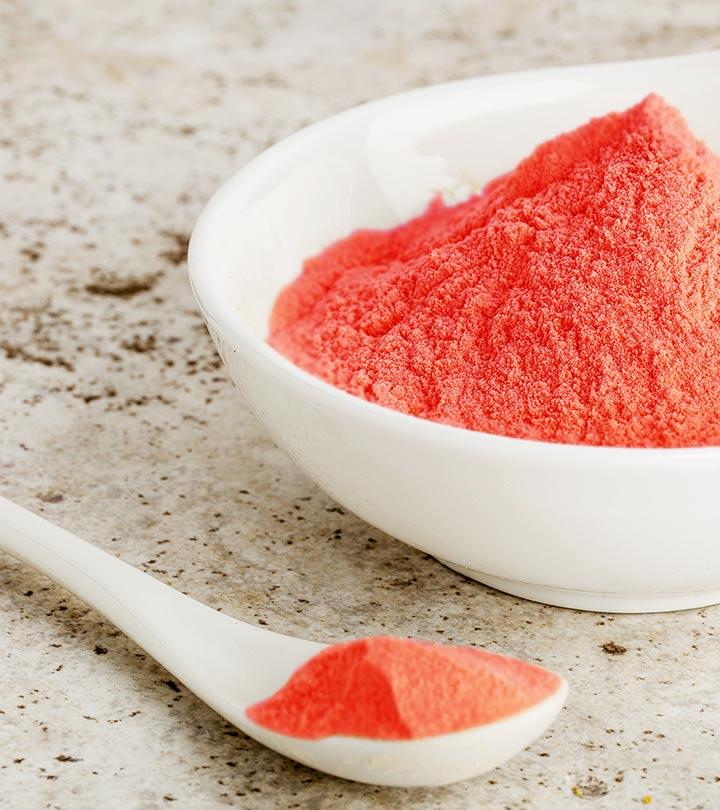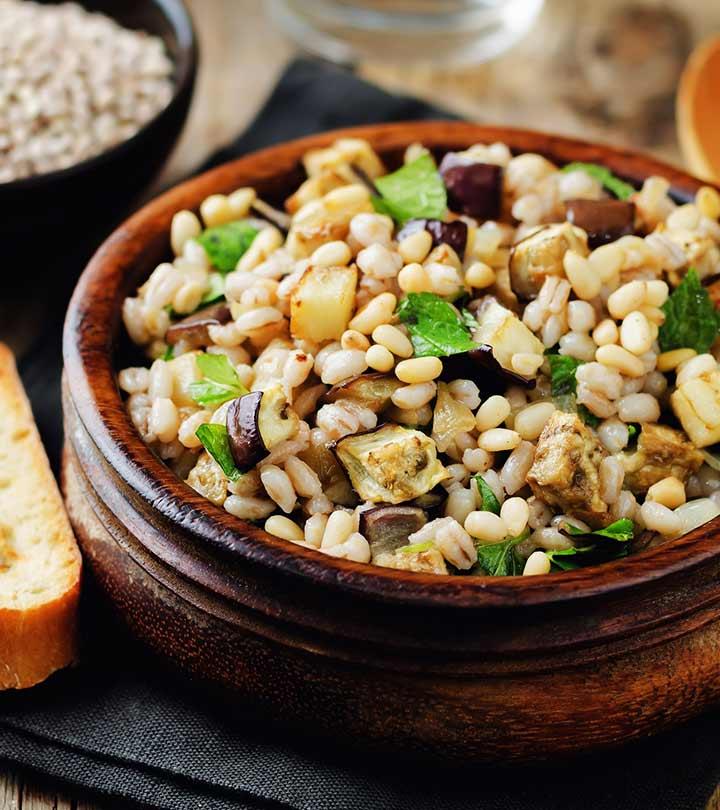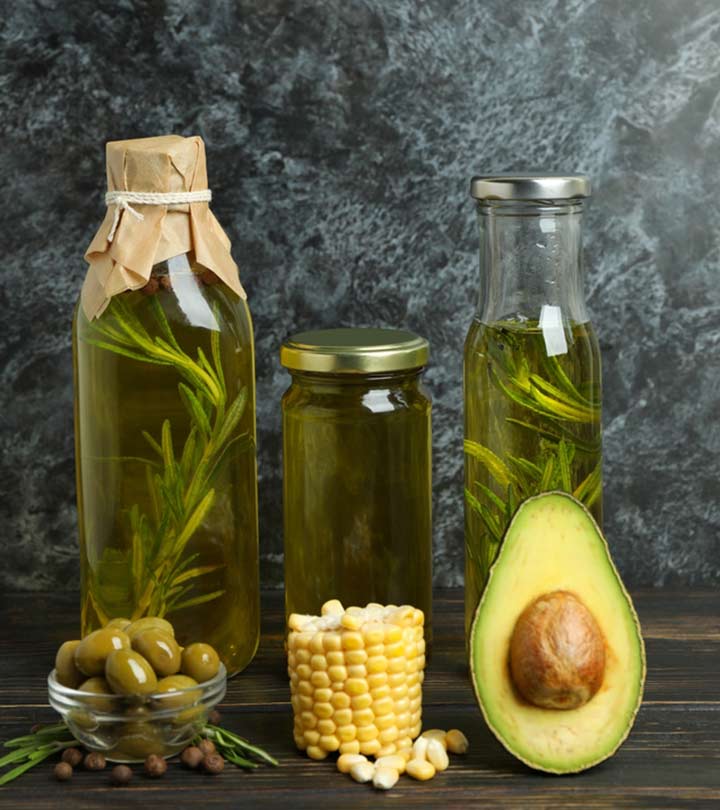Coconut Oil Side Effects: Diarrhea And More
Watch out for the adverse effects it can cause when consumed in excess.
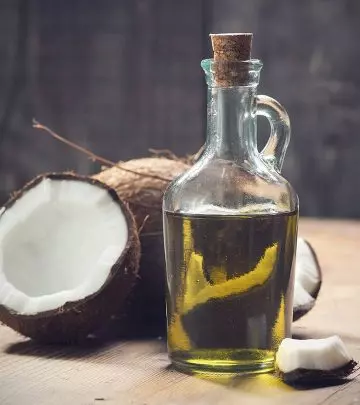
Image: Shutterstock
Coconut oil is lauded for its health benefits, and over 1500 scientific studies have proven its therapeutic uses.
The health benefits of coconut oil are due to the presence of medium-chain fatty acids (MCFAs) (also known as healthy fats, which are easier to digest) and its antimicrobial and antifungal properties.
But, are there any side effects of coconut oil with its excess consumption? After all, coconut oil contains a high percentage of saturated fat (around 92%), which can cause several side effects. Also, some studies recommend a lower intake of this fat (1).
This article explores the possible side effects of coconut oil with its excess intake. Keep reading to find out more!
 Know The Flip Side: Coconut Oil
Know The Flip Side: Coconut OilShort-Term Effects
Diarrhea, acne, headache, and yeast infections.
Long-Term Effects
Allergies causing thyroid malfunction in children, hives and anaphylaxis, elevated cholesterol levels, and increased heart disease risk.
Drug Interactions
Coconut oil can degrade the latex in latex condoms, causing issues. It also might react with a cholesterol-lowering drug called Statin.
When To See A Doctor
If you experience breathing difficulties, rapid heart rate, face swelling, or lightheadedness.
In This Article
Does Coconut Oil Have Any Side Effects?
Yes, if you consume it in excess. But this aspect requires clarity.
Coconut oil is available in the market in two forms – virgin coconut oil, and the commercial coconut oil.
Virgin coconut oil is the purest form of the oil. It is not processed. Hence, it ranks higher on the benefits and comes with almost no side effects. But the commercial coconut oil (which most of us use, possibly) is the processed variant. It does have certain side effects. A few of these include weight gain and an increase in bad cholesterol levels.
 Trivia
TriviaIn the following lines, we are going to expand on these side effects.
Side Effects Of Coconut Oil
There are also potential negative coconut oil side effects that we didn’t know about. Check out some of the surprising side effects of ingesting coconut oil. Only a few of the side effects are backed by research. We have categorized them accordingly.
1. May Elevate Cholesterol Levels
Some research states that saturated fat can elevate total cholesterol levels and the levels of LDL (the bad cholesterol) (2). This can increase the risk of cardiovascular disease. Coconut oil is among the foods with high saturated fat content, and taking it in high quantities may elevate cholesterol levels.
Though coconut oil can boost good cholesterol levels, it may not be preferred to other healthy vegetable oils.
The saturated fat content in coconut oil is higher than other fats or oils (butter or olive oil) (3). According to an advisory published by the American Heart Association, the saturated fat in coconut oil raised LDL cholesterol in ways similar to that in butter, beef, and palm oil (4).
2. May Cause Allergies
Though not as prevalent as other forms of allergies, coconut oil does cause allergies if one is sensitive to it. Hence, suggest you perform a patch test first.
Some of the allergic reactions include hives and anaphylaxis (a lethal emergency that involves troubled breathing). The information on coconut allergies is limited, as only a small number of individuals have been affected (5).
According to a Boston study, children having peanut allergies (or allergic to tree nuts) are less likely to be allergic to coconut oil (as coconut is not basically a nut, but a fruit) (6). However, if your child has any of these allergies, it is better to consult your doctor before letting them try coconut oil.
Here’s what you may need to avoid if you are allergic to coconut oil (or any form of coconut) – chocolates, cakes, and the popcorn that they sell at movie theaters.
If you suspect allergic reactions to coconut oil, it is better to keep track of your symptoms in a food diary and visit your health care specialist. This can help you get an insight into the allergy.
Some anecdotal evidence also suggests that coconut oil may lead to a rapid heart rate, facial swelling, and light headedness. If you are experiencing any of these, visit your doctor immediately.
Natacha, a blogger, experienced an allergic reaction to using coconut oil as a moisturizer. She said, “I had a tiny little rash on the knuckle on my right hand. It wasn’t itchy. I was still using coconut oil as a moisturizer for my hands and nails every night before going to bed. All I can say is that I haven’t had a rash since I stopped using coconut oil (i).”
A substance called coconut diethanolamide is manufactured from coconut oil, and it is used as an agent in hand washing liquids. As per a Finnish study, certain individuals experienced allergies after using products containing this agent (7).
3. May Increase Heart Disease Risk
Studies suggest that replacing coconut oil with unsaturated fats can help reduce the risk of cardiovascular disease (8).
According to the American Heart Association, consuming fewer saturated fats and more unsaturated fats is the best way to prevent heart disease. Coconut oil, being higher in saturated fats, may affect the heart if taken in excess (9).
Though coconut oil also contains unsaturated fat, there is no research that shows it mitigating the ill effects of saturated fat.
Coconut oil contains more bad fat than beef or butter (9 ). As per a New Zealand study, coconut oil increases bad cholesterol to a greater extent than unsaturated plant oils (10).
4. May Cause Mild Diarrhea
Some individuals taking virgin coconut oil for better nutrition experienced mild diarrhea during the first week. Other related symptoms included stomach ache and vomiting. These symptoms resolved after the first week, and none of these impacted the daily activities of the individuals (11).
To minimize these symptoms, you may need to first consume the oil in smaller amounts and then gradually work your way up to the required quantity.
Insufficient Evidence For
 Trivia
Trivia5. May Cause Acne Breakouts
This is more likely to happen to individuals with excessively oily skin. Though lauric acid may help treat acne (more so in the case of skin not very oily), excess of it may trigger acne.
What you can instead do is use coconut oil as a carrier oil in your skin care routine. Use other skin-friendly essential oils, along with coconut oil, to relieve acne.
6. May Cause Allergic Reactions In Children
Though coconut oil is good for children, there are certain aspects to be kept in mind. The most important of those aspects is a malfunctioning thyroid. If your child has hypothyroidism, refrain from using coconut oil (or related products) before consulting the doctor. This is because the oil might aggravate the condition and cause allergic reactions in some children.
7. May Cause Headache
Individuals undertaking detoxification using coconut oil (for yeast infections, especially) often experience headaches. This happens when the medium-chain fatty acids in coconut oil break down the yeast cells (that cause the infection), thereby releasing a wave of fungal toxins into the bloodstream.
8. May Cause Problems With Oil Pulling
If you are sensitive to coconut oil, using it for oil pulling could be a bad idea. You can instead use sunflower or sesame oil for this purpose as they also can help kill the harmful bacteria.
One important point to note with respect to oil pulling alone is that it is not a replacement for brushing. Nothing can remove bacteria and plaque from your teeth better than brushing your teeth daily.
9. May Cause Issues With Use As A Lubricant
Yes, coconut oil (virgin coconut oil) could be natural. But it may contain ingredients whose safety and efficacy are not known yet. This is why using coconut oil as a personal lubricant may not be a safe option.
Coconut oil is also known to alter the pH of the vagina, causing yeast infections. It can also degrade the latex in latex condoms and cause serious issues. Hence, one must not use any kind of oil-based lubricant with latex condoms.
10. Might Aggravate Candida
Though coconut oil can help treat Candida, what is of particular concern are the die-off symptoms. These occur as a result of the toxins released by the dying Candida.
Though the entire theory is speculative, it is always better to stay on the safer side.
The negative side effects of coconut oil, though not many, could be bothersome. Hence, exercise caution before using coconut oil.
Coconut Oil Supplements
Coconut oil supplements do enjoy the reputation of being safe. However, they are not devoid of the side effects, which are often the same as that of the oil.
Coconut oil supplementation has been found to worsen the levels of triglycerides and bad cholesterol. If you are to use coconut oil supplements, please exercise care and caution (12). Do not forget to consult your doctor.
People with kidney issues or dehydration must refrain from taking coconut oil or its supplements. This also applies to individuals with high cholesterol levels.
More importantly, the dosage of the supplement must be closely monitored. Exceeding the required dosage may upset the stomach. Also, when you are shopping for coconut oil supplements, you need to ensure the capsule is free of additives and lubricants. It is better if you also know the source and manufacturing process of the oil in the supplements.
How Much Coconut Oil Can You Consume In A Day?
Some research shows that a daily intake of 30 ml of virgin coconut oil in adults improved good cholesterol levels (11). Though there is no exact information on the right amount of coconut oil you can consume, you may stick to this dosage. You may start with as little as 5 ml and work your way up if you are not experiencing any side effects.
Special Precautions And Warnings
In the case of pregnant or breastfeeding women, coconut oil is likely safe if taken in normal amounts. Since the safety of larger amounts is unknown, it is better to stick to food amounts. However, research is limited in this aspect.
There is no information regarding its safety for children if the oil is taken orally or for longer periods. Hence, consult your doctor.
Infographic: 5 Side Effects Of Coconut Oil
Coconut oil is popularly known for a number of health benefits, but despite that, it has some side effects. It contains a high amount of saturated fats that can hinder your weight loss plans and cause a spike in cholesterol levels, which in turn might lead to the deposition of fatty content in the blood vessels and can cause a heart attack or stroke. Check out the infographic below to learn about the must know ill effects of coconut oil. Illustration: StyleCraze Design Team
Coconut oil is a popular cooking oil that is often used in baking. But if consumed in excess, it can result in many adverse effects. The side effects of coconut oil range from elevating the risk of cardiovascular disorders to possibly increasing blood Cholesterol Levels. These health complications are mainly attributed to its high saturated fat content. Due to its affiliation with tree nuts, coconut may cause allergic reactions in individuals who are allergic to nuts. Such individuals should practice caution and avoid using coconut oil. Limiting or avoiding its consumption can prevent these possible unwanted effects.
Keep the amount of consumption low. Solely relying on it is not advisable.
Frequently Asked Questions
Does coconut oil clog your arteries?
Coconut oil is high in saturated fats that may elevate serum cholesterol levels (13). Excess coconut oil consumption may also raise LDL cholesterol levels and possibly clog arteries in some individuals.
Does coconut oil cause inflammation?
No. Coconut oil exhibits anti-inflammatory properties that help reduce inflammation (14).
What happens if we drink coconut oil on an empty stomach?
Daily consumption of virgin coconut oil on an empty stomach may help cure stomach inflammation. However, some people had reported mild diarrhea in the first week (though the symptoms had resolved after the second week) (15).
Does coconut oil cleanse the colon?
Yes. Coconut oil may help cleanse the colon. Also, it may help improve digestion and prevent several digestive problems.
Can I apply coconut oil to the face?
Yes. You can apply coconut oil to the face and include it in your hair care routine.
Does coconut oil raise blood pressure?
Coconut oil helps lower blood pressure levels. However, there is limited research to prove this claim. Hence, consume it in moderation to avoid its adverse effects.
Key Takeaways
- The presence of medium-chain fatty acids and their antimicrobial and antifungal properties are reasons why coconut oil is considered to be beneficial.
- While pure and unprocessed coconut oil has little to no side effects unless over consumed, processed coconut oil may not be as healthy as believed.
- Coconut oil is high in saturated fat, which may lead to an increased risk of cardiovascular disease and weight gain if it is not consumed in moderation.

Image: Stable Diffusion/StyleCraze Design Team
Discover the dark side of coconut oil – from its environmental impact to its potential health risks. Check this video to uncover the truth and learn how to make informed decisions.
Personal Experience: Source
StyleCraze's articles are interwoven with authentic personal narratives that provide depth and resonance to our content. Below are the sources of the personal accounts referenced in this article.
i. Potentially less than pleasant side effects of oil pulling with coconut oil – and update https://sirenedelamer.wordpress.com/2013/08/04/less-than-pleasant-side-effects-of-oil-pulling-with-coconut-oil-and-update/References
Articles on StyleCraze are backed by verified information from peer-reviewed and academic research papers, reputed organizations, research institutions, and medical associations to ensure accuracy and relevance. Read our editorial policy to learn more.
- Coconut oil consumption and cardiovascular risk factors in humans, Nutrition Reviews, US National Library of Medicine, National Institutes of Health.
https://www.ncbi.nlm.nih.gov/pmc/articles/PMC4892314/ - Dietary fats, fatty acids, and their effects on lipoproteins. Current Atherosclerosis Reports, US National Library of Medicine, National Institutes of Health.
https://www.accessdata.fda.gov/scripts/interactivenutritionfactslabel/saturated-fat.html https://www.ncbi.nlm.nih.gov/pubmed/17045072/ - Randomised trial of coconut oil, olive oil or butter on blood lipids and other cardiovascular risk factors in healthy men and women, BMJ Open, US National Library of Medicine, National Institutes of Health.
https://www.ncbi.nlm.nih.gov/pubmed/29511019 - Replacing saturated fat with healthier fat may lower cholesterol as well as drugs in context of a healthy diet, American Heart Association Presidential Advisory.
https://newsroom.heart.org/news/replacing-saturated-fat-with-healthier-fat-may-lower-cholesterol-as-well-as-drugs-in-context-of-a-healthy-diet - Coconut Allergy Revisited, Children, US National Library of Medicine, National Institutes of Health.
https://www.ncbi.nlm.nih.gov/pmc/articles/PMC5664015/ - Characterizing the Relationship Between Sesame, Coconut, and Nut Allergy in Children, Pediatric allergy and immunology US National Library of Medicine, National Institutes of Health.
https://www.ncbi.nlm.nih.gov/pmc/articles/PMC2987573/ - Occupational allergic contact dermatitis due to coconut diethanolamide (cocamide DEA), Contact Dermatitis, US National Library of Medicine, National Institutes of Health.
https://www.ncbi.nlm.nih.gov/pubmed/8112067 - Coconut oil consumption and cardiovascular risk factors in humans, Nutrition Reviews, US National Library of Medicine, National Institutes of Health.
https://www.ncbi.nlm.nih.gov/pubmed/26946252 - Dietary Fats and Cardiovascular Disease: A Presidential Advisory From the American Heart Association, Circulation.
https://ahajournals.org/doi/full/10.1161/CIR.0000000000000510 - Coconut oil consumption and cardiovascular risk factors in humans, Nutrition Reviews, US National Library of Medicine, National Institutes of Health.
https://www.ncbi.nlm.nih.gov/pubmed/26946252 - Daily Consumption of Virgin Coconut Oil Increases High-Density Lipoprotein Cholesterol Levels in Healthy Volunteers: A Randomized Crossover Trial, Evidence-Based Complementary and Alternative Medicine, US National Library of Medicine, National Institutes of Health.
https://www.ncbi.nlm.nih.gov/pmc/articles/PMC5745680/ - The effects of coconut oil supplementation on the body composition and lipid profile of rats submitted to physical exercise, Anais da Academia Brasileira de Ciências, US National Library of Medicine, National Institutes of Health.
https://www.ncbi.nlm.nih.gov/pubmed/27192196 - The Effect of Coconut Oil Consumption on Cardiovascular Risk Factors: A Systematic Review and Meta-Analysis of Clinical Trials
https://pubmed.ncbi.nlm.nih.gov/31928080/ - Anti-inflammatory analgesic and antipyretic activities of virgin coconut oil
https://pubmed.ncbi.nlm.nih.gov/20645831/ - Daily Consumption of Virgin Coconut Oil Increases High-Density Lipoprotein Cholesterol Levels in Healthy Volunteers: A Randomized Crossover Trial
https://www.ncbi.nlm.nih.gov/pmc/articles/PMC5745680/ - Effects of chemical refinement on the quality of coconut oil
https://www.researchgate.net/publication/333150901_Effects_of_chemical_refinement_on_the_quality_of_coconut_oil
- Coconut oil consumption and cardiovascular risk factors in humans, Nutrition Reviews, US National Library of Medicine, National Institutes of Health.
- Coconut oil consumption and cardiovascular risk factors in humans, Nutrition Reviews, US National Library of Medicine, National Institutes of Health.
https://www.ncbi.nlm.nih.gov/pmc/articles/PMC4892314/ - Dietary fats, fatty acids, and their effects on lipoproteins. Current Atherosclerosis Reports, US National Library of Medicine, National Institutes of Health.
https://www.accessdata.fda.gov/scripts/interactivenutritionfactslabel/saturated-fat.html https://www.ncbi.nlm.nih.gov/pubmed/17045072/ - Randomised trial of coconut oil, olive oil or butter on blood lipids and other cardiovascular risk factors in healthy men and women, BMJ Open, US National Library of Medicine, National Institutes of Health.
https://www.ncbi.nlm.nih.gov/pubmed/29511019 - Replacing saturated fat with healthier fat may lower cholesterol as well as drugs in context of a healthy diet, American Heart Association Presidential Advisory.
https://newsroom.heart.org/news/replacing-saturated-fat-with-healthier-fat-may-lower-cholesterol-as-well-as-drugs-in-context-of-a-healthy-diet - Coconut Allergy Revisited, Children, US National Library of Medicine, National Institutes of Health.
https://www.ncbi.nlm.nih.gov/pmc/articles/PMC5664015/ - Characterizing the Relationship Between Sesame, Coconut, and Nut Allergy in Children, Pediatric allergy and immunology US National Library of Medicine, National Institutes of Health.
https://www.ncbi.nlm.nih.gov/pmc/articles/PMC2987573/ - Occupational allergic contact dermatitis due to coconut diethanolamide (cocamide DEA), Contact Dermatitis, US National Library of Medicine, National Institutes of Health.
https://www.ncbi.nlm.nih.gov/pubmed/8112067 - Coconut oil consumption and cardiovascular risk factors in humans, Nutrition Reviews, US National Library of Medicine, National Institutes of Health.
https://www.ncbi.nlm.nih.gov/pubmed/26946252 - Dietary Fats and Cardiovascular Disease: A Presidential Advisory From the American Heart Association, Circulation.
https://ahajournals.org/doi/full/10.1161/CIR.0000000000000510 - Coconut oil consumption and cardiovascular risk factors in humans, Nutrition Reviews, US National Library of Medicine, National Institutes of Health.
https://www.ncbi.nlm.nih.gov/pubmed/26946252 - Daily Consumption of Virgin Coconut Oil Increases High-Density Lipoprotein Cholesterol Levels in Healthy Volunteers: A Randomized Crossover Trial, Evidence-Based Complementary and Alternative Medicine, US National Library of Medicine, National Institutes of Health.
https://www.ncbi.nlm.nih.gov/pmc/articles/PMC5745680/ - The effects of coconut oil supplementation on the body composition and lipid profile of rats submitted to physical exercise, Anais da Academia Brasileira de Ciências, US National Library of Medicine, National Institutes of Health.
https://www.ncbi.nlm.nih.gov/pubmed/27192196 - The Effect of Coconut Oil Consumption on Cardiovascular Risk Factors: A Systematic Review and Meta-Analysis of Clinical Trials
https://pubmed.ncbi.nlm.nih.gov/31928080/ - Anti-inflammatory analgesic and antipyretic activities of virgin coconut oil
https://pubmed.ncbi.nlm.nih.gov/20645831/ - Daily Consumption of Virgin Coconut Oil Increases High-Density Lipoprotein Cholesterol Levels in Healthy Volunteers: A Randomized Crossover Trial
https://www.ncbi.nlm.nih.gov/pmc/articles/PMC5745680/ - Effects of chemical refinement on the quality of coconut oil
https://www.researchgate.net/publication/333150901_Effects_of_chemical_refinement_on_the_quality_of_coconut_oil





